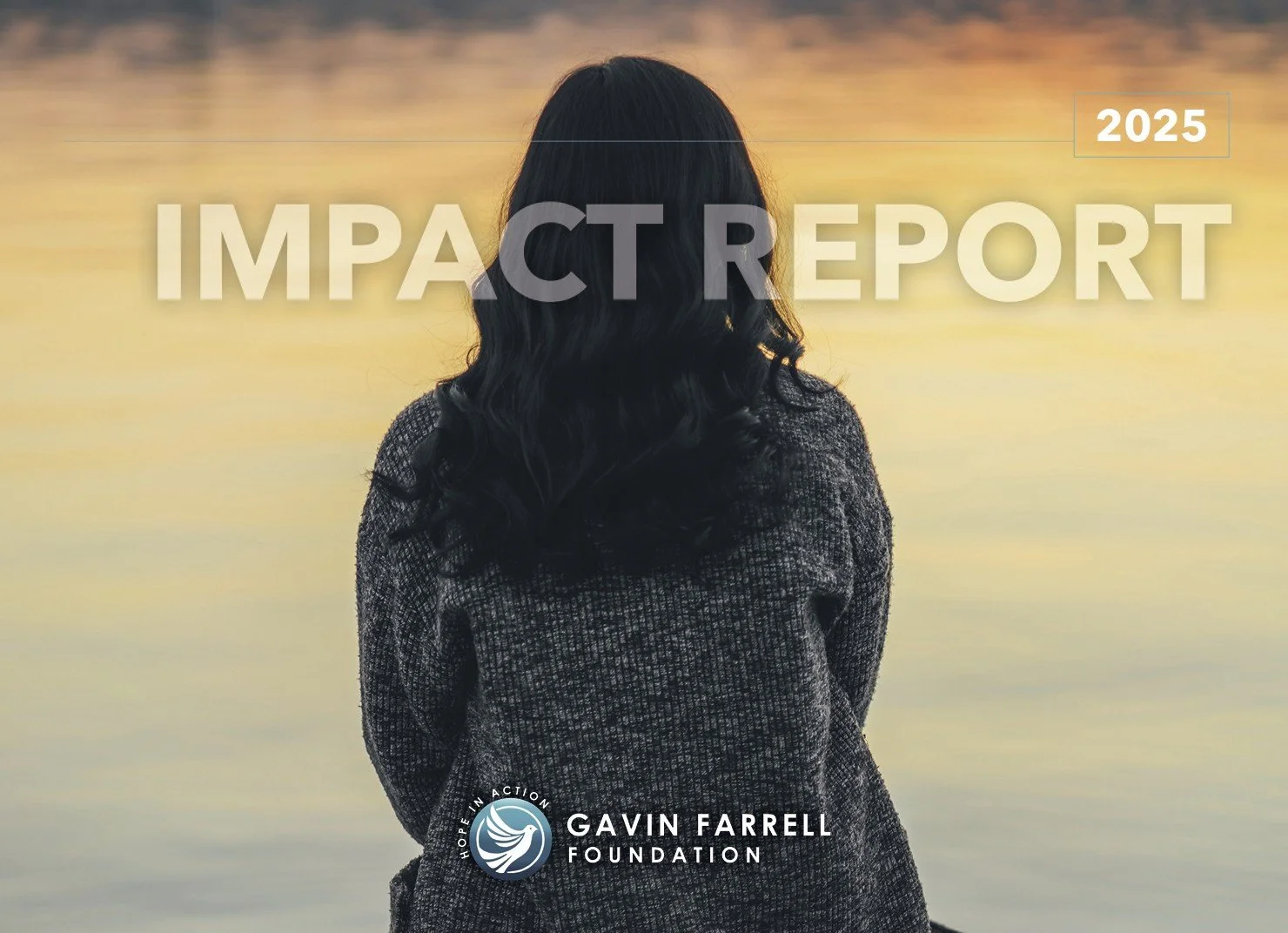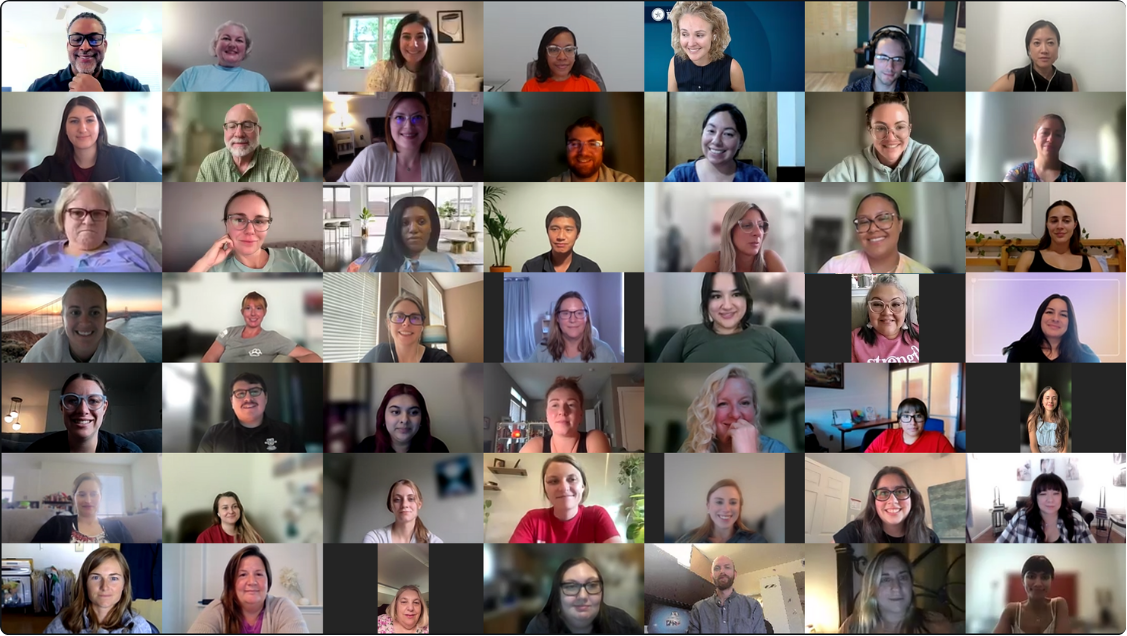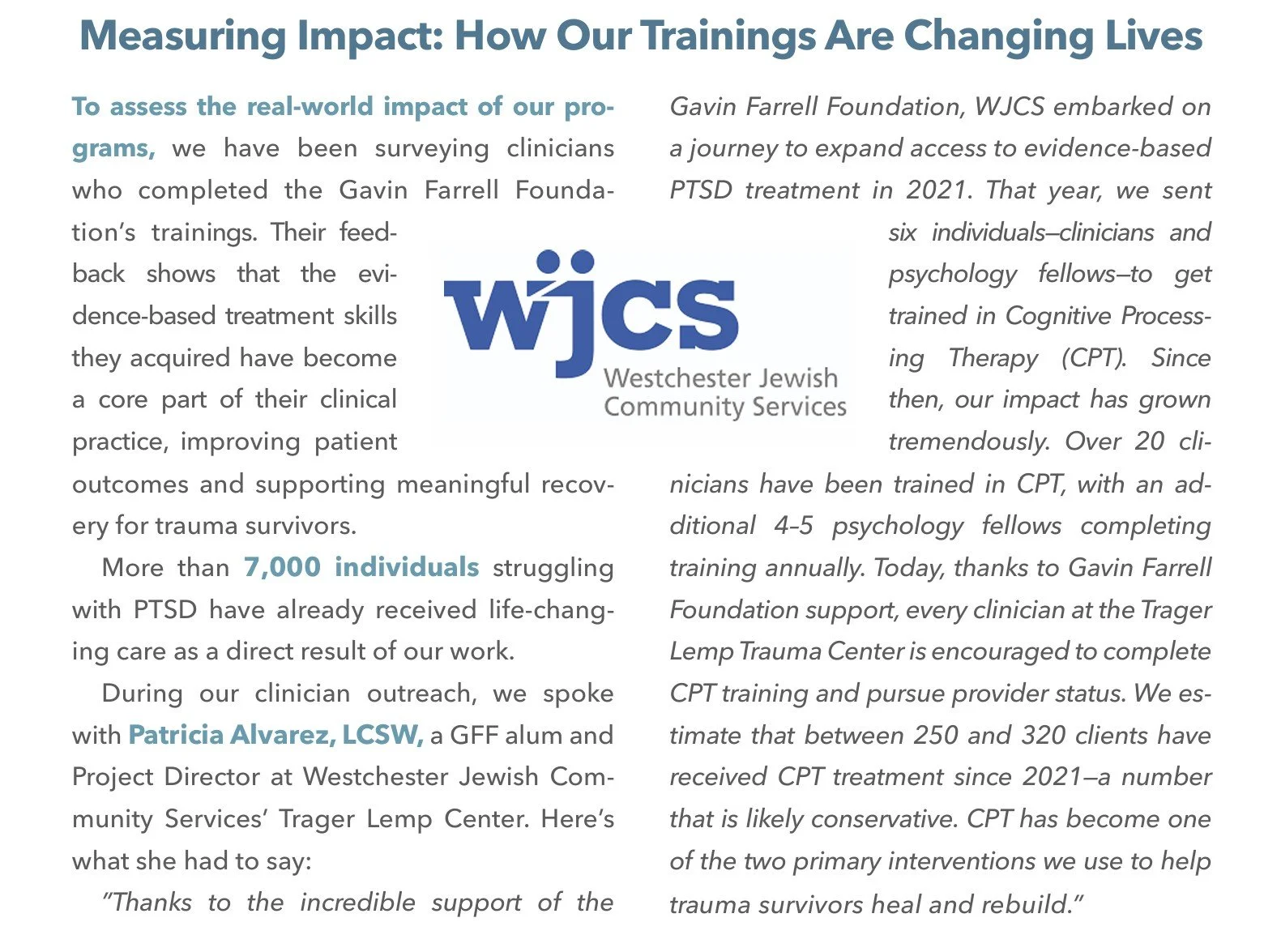The Gavin Farrell Foundation has trained
701 clinicians
A Hidden Epidemic
No one with PTSD should suffer in silence.
We can help.
The Gavin Farrell Foundation’s mission is to improve the lives of the vast number of individuals with Post-Traumatic Stress Disorder (PTSD) by increasing access to highly effective forms of treatment and raising awareness about their efficacy. By providing training in evidence-based therapy to licensed clinicians and mental health agencies, we help hundreds of therapists better support and deliver the care they need for an enhanced quality of life.
2025 Update
The Gavin Farrell Foundation remains committed to addressing PTSD domestically, where trauma’s ripple effects continue to impact communities across the country. In 2025, GFF’s national training initiative expanded its reach, hosting six evidence-based therapy workshops across the U.S.
These workshops included Cognitive Processing Therapy, Written Exposure Therapy, and Prolonged Exposure, equipping over 174 clinicians and 184 graduate students with tools proven to reduce PTSD symptoms and improve quality of life. Our training programs continue to focus on inclusion and diversity.
Since its inaugural training in 2018, GFF-trained clinicians have delivered life-saving care to more than 7,000 patients.
1326 Clients treated by GFF Trained Clients treated by GFF Trained Clinicians During Trainings
Clinician Impact Stories
Dr. Julio Sabater
Dr. Julio Sabater, a clinician serving his community in Pawtucket, Rhode Island, spent more than a decade working in counseling and school psychology before transitioning into clinical practice. Motivated by the need for effective trauma care for adults, he began his training in Cognitive Processing Therapy (CPT) through the support of the Gavin Farrell Foundation. With expert guidance and ongoing consultation, he grew in confidence and clinical skill, witnessing meaningful breakthroughs in his clients.
Chelsi’s Story
Chelsi Torres, a clinician at the UT Health Houston Trauma and Resilience Center, provides trauma-focused care for survivors of intimate partner violence, first responders, and combat veterans. Through the support of the Gavin Farrell Foundation, she completed training in three evidence-based treatments: CPT, PE, and WET. With expert consultation and ongoing mentorship, she has seen rapid and meaningful im provements in her clients.
Patient Impact Stories
“Ava’s” Story
“Ava,” a 23-year-old survivor of childhood sexual abuse, carried years of shame, intrusive thoughts, and nightmares that isolated her. Through the support of the Gavin Farrell Foundation, she received Written Exposure Therapy and experienced a dramatic shift in only five sessions. By session three, she could separate her past from her present and began sharing her story with trusted people for the first time. Ava now feels safer, and open to connection, proving how quickly trauma-focused treatments can create real relief and transformation.
“Jose’s” Story
After the traumatic loss of his girlfriend, Ana, Jose found himself using alcohol to avoid his pain and grief. He met with a therapist who recognized that Jose was experiencing symptoms of PTSD in addition to loss and grief. After 11 sessions of CPT, Jose was able to re-engage in life, feel joy, and start to share positive memories about Ana. He is now able to parent his daughter and support her in grieving the loss of her mother.
“Rayna’s” Story
“Rayna” endured severe trauma from early childhood through adulthood, suffering abuse from family and community members, as well as in her marriage. Misdiagnosed with depression, she spent decades in isolation and struggled with worsening mental health until finally being diagnosed with PTSD in her 50s. Through the support of the Gavin Farrell Foundation, she began Prolonged Exposure Therapy (PE), which led her to full remission after just 10 sessions. Now, Rayna embraces life beyond her home, finding freedom and connection as she continues to rebuild her future
“Caitlyn’s” Story
“Caitlyn,” a 15-year-old high schooler, was isolated and depressed. For months, she endured physical, sexual, and emotional abuse from a close friend and classmate, leading her to develop post-traumatic stress disorder (PTSD), feelings of guilt, and self-doubt. Previously happy-go-lucky and involved, Caitlyn became withdrawn and uncomfortable in social settings. Through treatment for PTSD, she was able to return to typical teenage challenges.
“Maria’s” Story
Learn about Maria, a domestic abuse survivor who suffered from PTSD, and sought treatment with Cognitive Processing Therapy (CPT), aimed at re-establishing her self-worth and life purpose. Through the Gavin Farrell Foundation’s sponsorship of specific PTSD therapy, Maria was able to challenge her initial negative beliefs and recognize the true culprit responsible for her stress and depression.
As clinicians, we understand trauma and post-traumatic stress disorder (PTSD) is a part of many of our clients’ experiences. Sonia Wagner, LCSW-R, Executive Vice President, MHA Rockland, shares her first-hand account, demonstrating how this treatment produces better client outcomes while equipping therapists with tools and resources to effectively implement this treatment strategy.
““Since getting certified in CPT in 2020, I have completed treatment with about 35 clients, with diverse ages and backgrounds. In my experience as a clinician, CPT has been the single most effective intervention for PTSD that I have encountered.””
2024 Impact Report
The Gavin Farrell Foundation has undertaken a research study of our implementation and dissemination of CPT training at NYU. Our findings show that, on average, clients who participated in CPT experienced a substantial alleviation in their PTSD symptoms, and their functioning in areas such as work and family relationships improved significantly. Most of the people who completed all 12 sessions reported PTSD symptom levels that fell below the symptom level that would suggest a PTSD diagnosis.
“I’ve been doing CPT treatment since last year and I noticed a change in how I deal with the trauma I have endured. It was very scary at first because I never dealt with what I’ve been through but I started noticing a lot of changes within myself. CPT treatment has helped me deal with my every day stressors. I find myself using what I have been taught in treatment in my every day life. I find this treatment to be very helpful. Go in with an open mind and know that eventually it will pay off and it’s what is best for you. I think it’s something that should be available to everyone who has PTSD. I’m glad I did this even though there were times when I was overwhelmed and thought I couldn’t do anymore I’m glad I stuck with it.”
— CPT Patient







